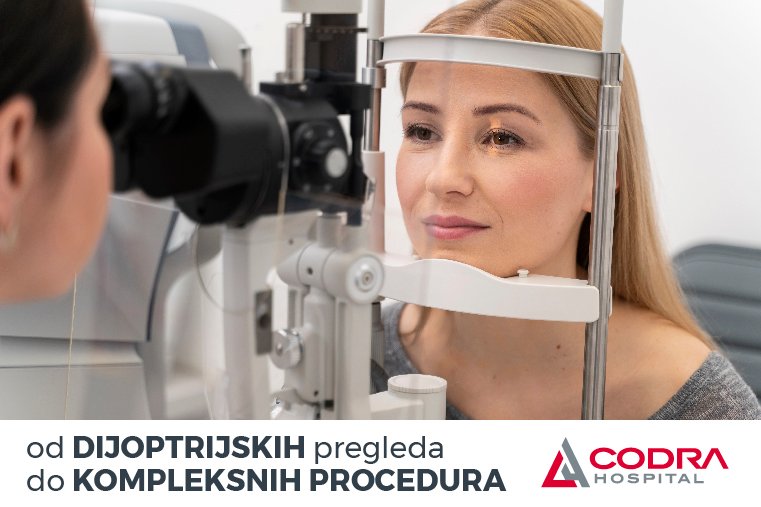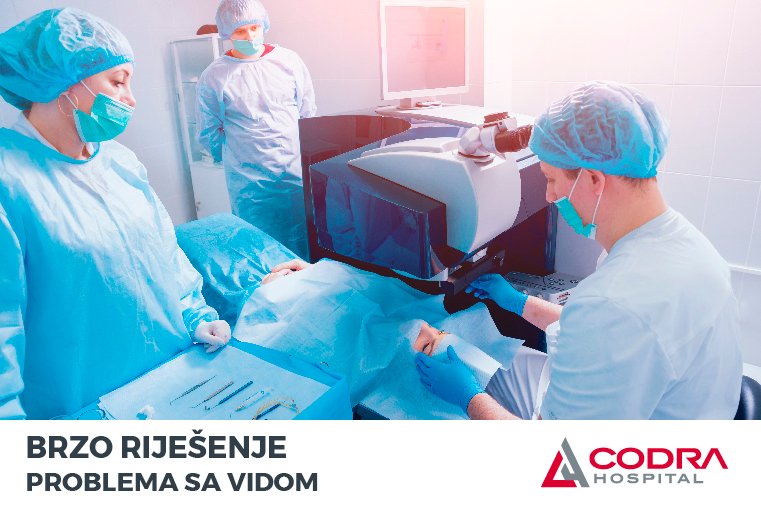The expert team of ophthalmologists at CODRA Hospital makes sure that all your eyesight problems are solved quickly and efficiently. The shortest path to a precise diagnosis is through research and the most up-to-date approach and modern technology, for a permanent solution to the problem.
In the Ophthalmology Center of CODRA Hospital, starting from dioptric examinations, to solving more complex procedures, constantly improving and using the most modern technologies, our team is ready to respond to any challenge. The diagnostic procedures we use are mostly non-invasive for the patient. With a detailed medical history and with the help of modern equipment, we diagnose the problem, give further guidelines and propose the best solution for your eyes. Together and committed to the goal.
AMBULATORY PART
Within the Ophthalmology Center in two ophthalmology outpatient clinics, equipped with the most modern equipment the following diagnostic procedures are performed:
Complete ophthalmic examination, ophthalmic ultrasound examination (AiB scan), OCT-optical coherence tomography, computerized visual field (CVP), eye pressure measurement, daily eye pressure curve, eye dryness test (Schirmer test), pachymetry, IOL Master-biometric characteristics of the cornea and lenses, color vision testing.
OPERATIONAL PART
Within the surgical block of the CODRA Hospital, with seven ORs, one is intended exclusively for ophthalmology and is equipped with the most modern devices of the state of the art technology for performing eye surgical procedures:
MICROSURGERY OF THE EYE
CATARACT SURGERY-Ultrasonic surgery-phacoemulsification, comfortable and fast, painless, in less than 10 minutes, under local anesthesia, in a one-day surgery-without staying in the hospital, visual function impaired by cataracts is restored. This allows you to see immediately after the surgery. By choosing the appropriate intraocular lens, in consultation with the ophthalmologist, short-sightedness and long-sightedness shall be rectified this way.
If you do not want to depend on glasses – neither for distance, nor for reading or working on the computer, then your choice is a multifocal implant. Only the vast experience in this technique, as well as in solving various complicated cases, gives maximum safety and use of all possibilities of modern ophthalmology.
VITRECTOMY (retina and vitreous surgery)
A detached retina or retinal ablation is not a reason to lose your eyesight. The team of experts at the CODRA Hospital will make an appropriate assessment of the state of your retina and decide whether you need modern intervention, vitrectomy, in order to surgically treat the retina and restore your eyesight!
Thanks to the work of top experts and the use of high-tech equipment, perfect visualization is achieved during the operation, which allows reaching the outermost periphery of the fundus, which provides the conditions for the most precise and refined surgery and complete resolution of retinal problems with a long-lasting effect.
In addition to the aforementioned microsurgical procedures the following procedures are also being performed at the CODRA Hospital:
Glaucoma surgery (trabeculectomy )
Glaucoma, Glaucoma, in its broadest sense, consists of a group of diseases that cause damage to the optic nerve and loss of eyesight, blindness as a definitive end, if left untreated.
It is most often chronic, often occurs silently, without noticeable symptoms in the beginning, painless, and yet an alarming number of people of all age groups end up being blind.
Elevated eye pressure, as the most common symptom of the disease, cause no pain except in values twice higher than normal. In situations of acute conditions, with high values of eye pressure, the eye is “hard” and painful, with the pain spreading through the entire half of the head.
Glaucoma attacks peripheral vision first, while central vision remains preserved for a long time. That is why the first symptoms are “silent”. When there is pain and an obvious defect in the field of vision, usually a large part of the nerve has already failed, and the damage is irreversible.
Therapy at this point aims to stop the disease at that stage and to keep the pressure in the eye under control. This is a lifelong illness, and timely and adequate therapy keeps it under control and enables a normal life.
- Xanthelasma on the eyelids
- Removal of excess skin on the eyelids, entropion and ectropion of the eyelid (twisted and everted eyelid)
- Pterygium – Internal duplication of the conjunctiva by the method of autotransplantation
- Halation on the eye,
- Tumors on the eyelids and conjunctiva
Our expert team of ophthalmologists takes care of you:
– Prof. Dr Tamara Milenkaja
– Prof. Dr Petar Aleksić
– Dr Vladimir Draganić
– Dr sci. med. Siniša Babović
– Prof Dr Miroslav Stamenković
– Dr Nebojša Nikitović
– Dr Jelena Radojičić
– Prof dr Sofija Davidović






